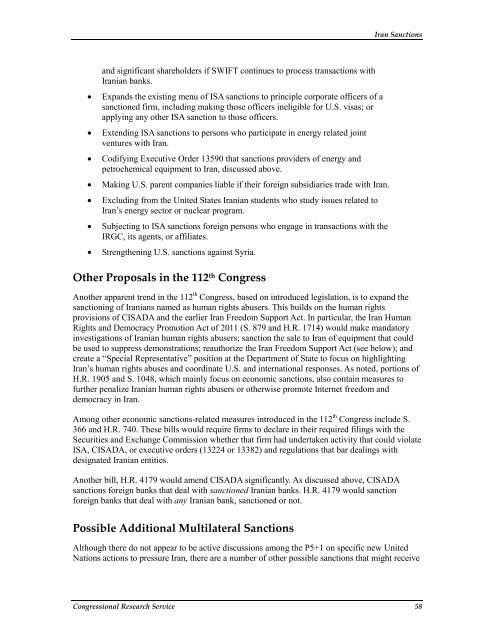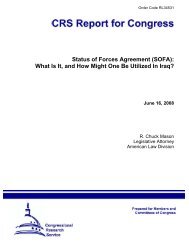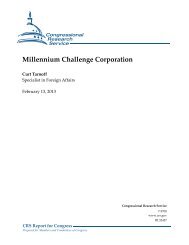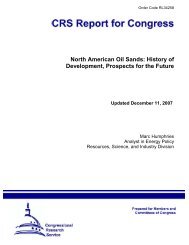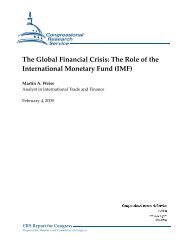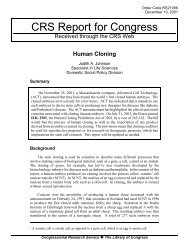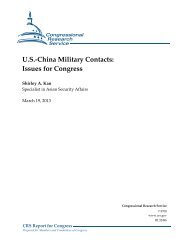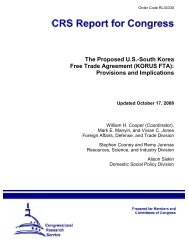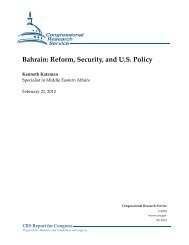Iran Sanctions - Foreign Press Centers
Iran Sanctions - Foreign Press Centers
Iran Sanctions - Foreign Press Centers
Create successful ePaper yourself
Turn your PDF publications into a flip-book with our unique Google optimized e-Paper software.
and significant shareholders if SWIFT continues to process transactions with<br />
<strong>Iran</strong>ian banks.<br />
• Expands the existing menu of ISA sanctions to principle corporate officers of a<br />
sanctioned firm, including making those officers ineligible for U.S. visas; or<br />
applying any other ISA sanction to those officers.<br />
• Extending ISA sanctions to persons who participate in energy related joint<br />
ventures with <strong>Iran</strong>.<br />
• Codifying Executive Order 13590 that sanctions providers of energy and<br />
petrochemical equipment to <strong>Iran</strong>, discussed above.<br />
• Making U.S. parent companies liable if their foreign subsidiaries trade with <strong>Iran</strong>.<br />
• Excluding from the United States <strong>Iran</strong>ian students who study issues related to<br />
<strong>Iran</strong>’s energy sector or nuclear program.<br />
• Subjecting to ISA sanctions foreign persons who engage in transactions with the<br />
IRGC, its agents, or affiliates.<br />
• Strengthening U.S. sanctions against Syria.<br />
Other Proposals in the 112 th Congress<br />
<strong>Iran</strong> <strong>Sanctions</strong><br />
Another apparent trend in the 112 th Congress, based on introduced legislation, is to expand the<br />
sanctioning of <strong>Iran</strong>ians named as human rights abusers. This builds on the human rights<br />
provisions of CISADA and the earlier <strong>Iran</strong> Freedom Support Act. In particular, the <strong>Iran</strong> Human<br />
Rights and Democracy Promotion Act of 2011 (S. 879 and H.R. 1714) would make mandatory<br />
investigations of <strong>Iran</strong>ian human rights abusers; sanction the sale to <strong>Iran</strong> of equipment that could<br />
be used to suppress demonstrations; reauthorize the <strong>Iran</strong> Freedom Support Act (see below); and<br />
create a “Special Representative” position at the Department of State to focus on highlighting<br />
<strong>Iran</strong>’s human rights abuses and coordinate U.S. and international responses. As noted, portions of<br />
H.R. 1905 and S. 1048, which mainly focus on economic sanctions, also contain measures to<br />
further penalize <strong>Iran</strong>ian human rights abusers or otherwise promote Internet freedom and<br />
democracy in <strong>Iran</strong>.<br />
Among other economic sanctions-related measures introduced in the 112 th Congress include S.<br />
366 and H.R. 740. These bills would require firms to declare in their required filings with the<br />
Securities and Exchange Commission whether that firm had undertaken activity that could violate<br />
ISA, CISADA, or executive orders (13224 or 13382) and regulations that bar dealings with<br />
designated <strong>Iran</strong>ian entities.<br />
Another bill, H.R. 4179 would amend CISADA significantly. As discussed above, CISADA<br />
sanctions foreign banks that deal with sanctioned <strong>Iran</strong>ian banks. H.R. 4179 would sanction<br />
foreign banks that deal with any <strong>Iran</strong>ian bank, sanctioned or not.<br />
Possible Additional Multilateral <strong>Sanctions</strong><br />
Although there do not appear to be active discussions among the P5+1 on specific new United<br />
Nations actions to pressure <strong>Iran</strong>, there are a number of other possible sanctions that might receive<br />
Congressional Research Service 58


